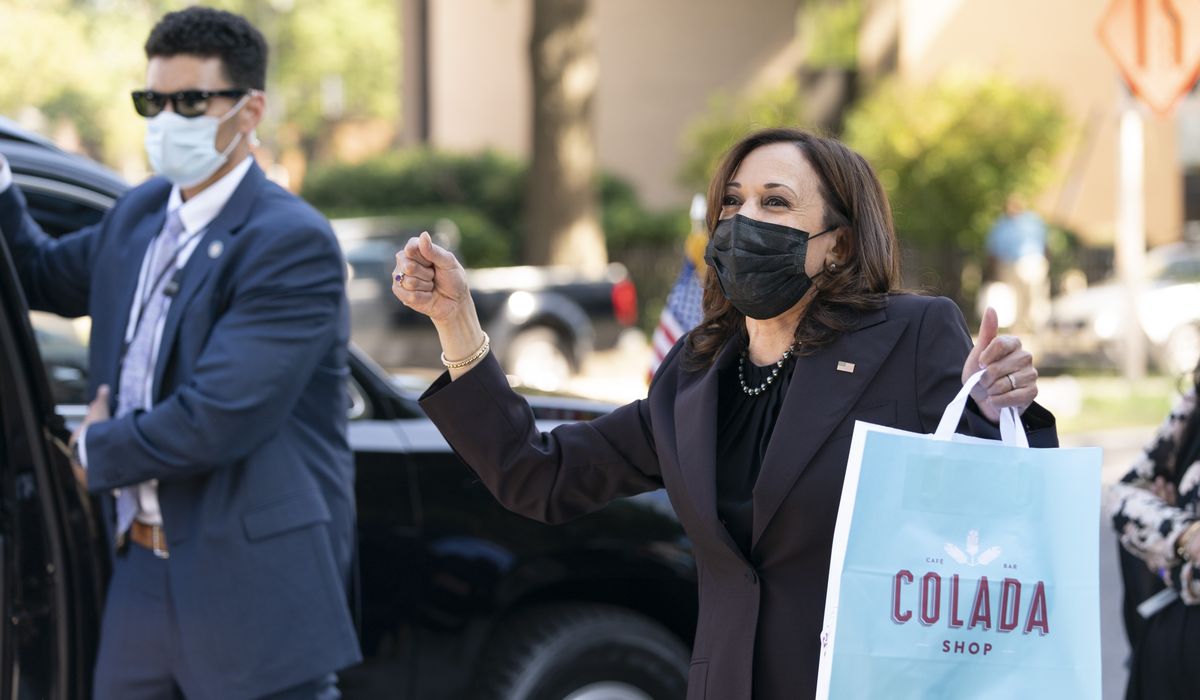
Vice President Kamala Harris has been mostly missing in action during the spending talks on Capitol Hill, renewing questions about her role in the Biden White House and her overall effectiveness.
Just one event was on Ms. Harris’ public calendar Tuesday. In a virtual appearance with the Democratic National Committee, she tried to ramp up enthusiasm for next year’s midterm elections.
“We all know what’s at stake,” said Ms. Harris, describing new election and abortion legislation in Texas as “anti-voter laws” and “anti-woman laws.”
“We’ve got to make it clear to the American people that Democrats who are fighting against the unfairness, the injustice of these approaches, that Democrats are on their side,” she said. “Democrats fight for the people. So to win this fight for our future, we must deliver for the American people.” Ms. Harris visited a Cuban cafe in Washington on Monday after a weekend escape to Palm Springs, California, for what the White House billed as “a private family matter.”
President Biden, meanwhile, has mounted an aggressive public relations campaign for massive investments in transportation and a social agenda, with tax hikes on the rich to pay for it all.
Mr. Biden flew to Michigan on Tuesday to tout his vision. Days earlier, he went to Capitol Hill with hopes that the 36 years he spent in the Senate gave him enough skills to break the impasse between moderate and far-left Democrats.
As the Senate continued to grapple with partisan impasses on spending and the nation’s debt limit on Wednesday, Ms. Harris had a relatively light public schedule. After having lunch with the president, she was scheduled to meet with the Council of Presidents of the National Pan-Hellenic Council, the umbrella group for historically black fraternities and sororities.
Ms. Harris’ lack of public engagement in the negotiations has fed lingering concerns about her first year in office. Many Democrats are waiting for her to play a more transformative role and cement herself as the heir apparent to Mr. Biden.
Jim Manley, a longtime aide to top Senate Democrats, dismissed the idea that Ms. Harris’ brief stint in the Senate would make her a valuable asset in the negotiations.
“She came to the Senate at a time [in 2017] when it was broken,” Mr. Manley said. “As someone who spent 21 years in the Senate, I am not sure that she has any great insights from her time in the Senate.”
“That is just a fact,” Mr. Manley said. “She is no master of the Senate.”
Mr. Manley said it makes sense that Mr. Biden is more involved in the talks than Ms. Harris.
“I don’t buy into the idea that she needs to be more intimately involved with negotiations on Capitol Hill,” Mr. Manley said. “Among other things, I am always concerned with having too many cooks in the kitchen with this kind of thing because that is when mistakes get made.”
With his agenda hanging in the balance, Mr. Biden began taking a more active role in the talks last week. He met with House Speaker Nancy Pelosi and other Democratic lawmakers before insisting to reporters, “We’re going to get this done.”
Ms. Harris did not accompany him.
During more than three decades in the Senate, Mr. Biden was the consummate deal-maker. He cultivated connections with members of both parties, including Senate Republican leader Mitch McConnell.
That made him a valuable asset for President Obama, who called on his vice president to play a lead role in high-stakes legislative talks.
John Feehery, a Republican Party strategist who worked for Speaker J. Dennis Hastert, said Ms. Harris simply doesn’t have deep ties.
“The reason that Obama used Biden is because Biden had a relationship with McConnell,” Mr. Feehery said. “Who does Harris have a relationship with? She has nothing to add, so her role is necessarily limited.
“Her presence would likely lead to confusion and more leaks.”
White House press secretary Jen Psaki denies that Ms. Harris has been relegated to the sidelines.
“She’s been making calls herself, just like the president,” Ms. Psaki said at a daily press briefing last week. “If it’s constructive for her to go to the Hill or for him to go to the Hill, to have members down here, they’ll do that.”
Whatever the case, Ms. Harris’ role in the Biden administration remains a work in progress after eight months, and her image could use a boost.
The latest Real Clear Politics average of polls shows 50% of voters disapprove of Ms. Harris’ performance and 41% approve. Mr. Biden ranks higher: 49% disapprove and 45% approve.
The vice president’s favorables started falling after Mr. Biden tasked her with addressing the “root causes” of migration to the U.S.-Mexico border and overseeing his push to deliver aid to Central American countries.
It has been a bumpy ride.
On her first foreign trip to Mexico and Guatemala in early June, Ms. Harris faced blowback from grassroots activists and far-left lawmakers for telling immigrants “not to come.” She also left some dumbfounded after she flubbed a question from NBC’s Lester Holt about why she had not visited the U.S.-Mexico border.
Politico reported around that time that Ms. Harris’ office was dysfunctional. Morale reportedly had sunk to a new low among members of her staff, and the vice president was blamed for helping create an “abusive environment.”
Ms. Harris also stayed out of the headlines during Mr. Biden’s chaotic withdrawal of troops from Afghanistan, which overshadowed her trip to Southeast Asia.
It all has provided more fodder for her critics on the left and the right.
Democrats lament behind the scenes that Ms. Harris has been ineffective since taking the oath of office. They say it is not clear what she is doing and are dismayed, but not surprised, by reports of an office in disarray.
Republicans say Ms. Harris’ presidential aspirations have taken a hit.
“I consider her to be impeachment insurance for Biden,” said John McLaughlin, a Republican Party pollster. “As long as she is vice president, Democrats won’t get rid of him.”
Seeking to right the ship, Ms. Harris beefed up her staff in early September with the hires of Lorraine Voles, a political veteran and crisis communication expert, and Adam Frankel, a former Obama speechwriter, according to The Washington Post.
Ms. Harris, the daughter of an Indian mother and Jamaican father, made history as the first woman and first woman of color to become vice president.
It was, among other things, a hat tip to Black voters who helped resuscitate Mr. Biden’s sputtering primary bid.
It put Ms. Harris a heartbeat away from the presidency and an election or two from mounting a presidential bid of her own.
Mr. Biden said he selected Ms. Harris because he wanted someone who would be as loyal to him as he was to Mr. Obama and because she is “ready to lead on Day One.”








